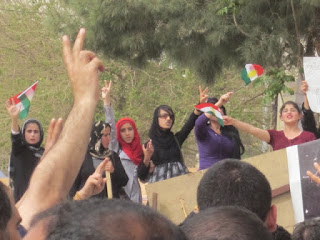Ibrahim mosque- Our house is quite near to this mosque. Every day we hear the call to prayer 5 times. I quite like it although it is loud. The main muezzin at this mosque has a wonderful voice. It gives me the moment to pause and listen and pray in my way.
This watermelon (shutti) salesman ( the man in the blue shirt) brings his truck to just in front of the mosque. He is teaching me the ways of finding a good watermelon.
Usually what wakes me up in the morning is not the call to prayer, but the children coming to school around 7:30. The city does not have enough school space for all the children, so they either go in the morning or afternoon. I saw these two as the morning class was breaking for lunch. I motioned to ask if I could take their photos. They moved forward and looked much more serious and all of a sudden the woman who was a passerby decided she wanted to get into the picture too.
This shop is around the corner. The man in black knows some English so he has been coaching me in names of fruit and veg as well as how to hear and say the words to do with money. He is quite patient. Aren't the colours wonderful
This shop is one of the new addtitions to the neighbourhood. It is a pastry shop and the best thing it has is cream puffs. All of these are usually sold in 1/2 kilo or 1 kilo boxes. They are a great gift to take when invited out for supper. The first time I met him I ask for half a kilo of the puffs. He laughed at me because hafta is the word for 80!! That day I learned that nue is the word for 1/2.
These men are not from my neighbourhood, but I just love the picture. This was taken about 5 minutes after we had run from the gunfire in the square. We had run to one of the streets that lead out of the square. My heart was beginning to slow down when I looked across the road and saw this shop still open and the men calmly standing waiting for paint customers.















